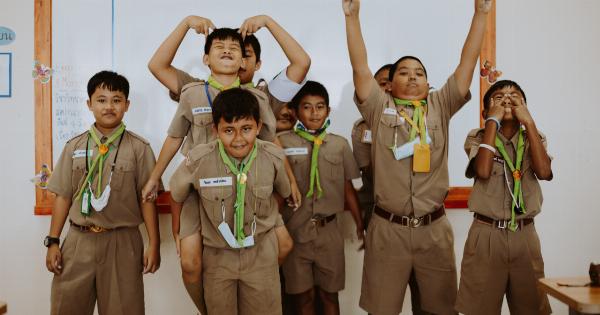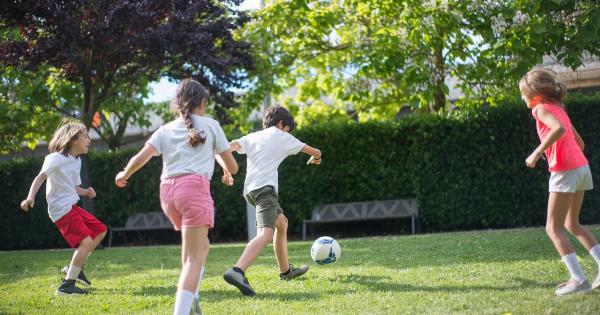Children with disabilities often face additional challenges when it comes to social engagement.
These challenges can range from physical limitations to communication barriers, making it more difficult for them to participate in social activities and build meaningful relationships. However, it is essential to create opportunities for social engagement for children with disabilities.
By doing so, we can help them develop vital social skills, improve their overall well-being, and ensure they have a sense of belonging in their communities.
The Importance of Social Engagement for Children with Disabilities
Social engagement plays a crucial role in the development of all children, and it is particularly important for children with disabilities. Here are a few reasons why social engagement is essential for them:.
1. Development of Social Skills
Engaging in social activities allows children with disabilities to develop essential social skills such as communication, empathy, and cooperation.
These skills not only help them interact with others but also prepare them for future relationships and employment opportunities.
2. Improved Mental and Emotional Well-being
Social isolation can have detrimental effects on mental and emotional well-being. By providing opportunities for social engagement, we can help children with disabilities combat feelings of loneliness and low self-esteem.
Social interaction can boost their self-confidence, promote positive mental health, and enhance overall emotional well-being.
3. Breaking Stereotypes and Building Inclusive Communities
Creating opportunities for social engagement for children with disabilities helps break down stereotypes and prejudices. When children interact with their peers who have disabilities, they learn to accept and appreciate individual differences.
This, in turn, fosters inclusive communities where every child is valued and respected.
Strategies for Creating Opportunities for Social Engagement
1. Inclusive Education
Inclusive education is an excellent way to create opportunities for social engagement for children with disabilities.
By promoting inclusive classrooms, where children with disabilities are educated alongside their typically developing peers, we can facilitate interaction and understanding. This allows for the development of relationships and friendships that extend beyond the classroom.
2. Peer Support Programs
Implementing peer support programs can be highly beneficial for children with disabilities. These programs pair children with disabilities with typically developing peers who act as mentors and friends.
Peer support programs not only provide opportunities for social engagement but also foster a sense of belonging and mutual support.
3. Extracurricular Activities
Offering a variety of extracurricular activities that cater to the interests and abilities of children with disabilities can promote social engagement.
Whether it’s sports, arts, or clubs, these activities provide opportunities for children to interact with their peers, learn new skills, and pursue their passions.
4. Communication Support
Effective communication is vital for social engagement. Providing communication support, such as assistive technology or sign language interpreters, can enable children with disabilities to better connect with others.
This support ensures that they can actively participate in conversations and express themselves, fostering meaningful social interactions.
5. Community Involvement
Encouraging community involvement for children with disabilities allows them to engage with the wider community and build social connections.
This can involve volunteering, participating in community events, or joining clubs and organizations that align with their interests. By actively contributing to their communities, children with disabilities can develop a sense of purpose and belonging.
Evaluating the Effectiveness of Social Engagement Programs
It’s crucial to evaluate the effectiveness of social engagement programs for children with disabilities to ensure they are achieving the desired outcomes. Here are a few evaluation strategies:.
1. Participant Feedback
Collecting feedback from the children involved in the social engagement programs can provide valuable insights into their experiences.
Surveys, interviews, and focus groups can help gather feedback on the program’s effectiveness and identify areas for improvement.
2. Parent and Teacher Observations
Parents and teachers play a vital role in monitoring the social progress of children with disabilities.
Regular communication with parents and teachers can help assess changes in the child’s social behavior and determine the impact of the social engagement programs.
3. Social Skill Assessments
Social skill assessments can be conducted before and after participation in social engagement programs to measure progress.
These assessments evaluate specific social skills, such as communication, cooperation, and problem-solving, providing objective data for program evaluation.
Conclusion
Creating opportunities for social engagement in children with disabilities is paramount for their overall development and well-being.
By implementing inclusive education, peer support programs, extracurricular activities, communication support, and community involvement, we can provide children with disabilities the chance to thrive socially. Moreover, it is essential to evaluate these engagement programs to ensure their effectiveness and make necessary improvements.
By fostering social engagement, we create a more inclusive and accepting society where all children have equal opportunities to form meaningful connections and lead fulfilling lives.































